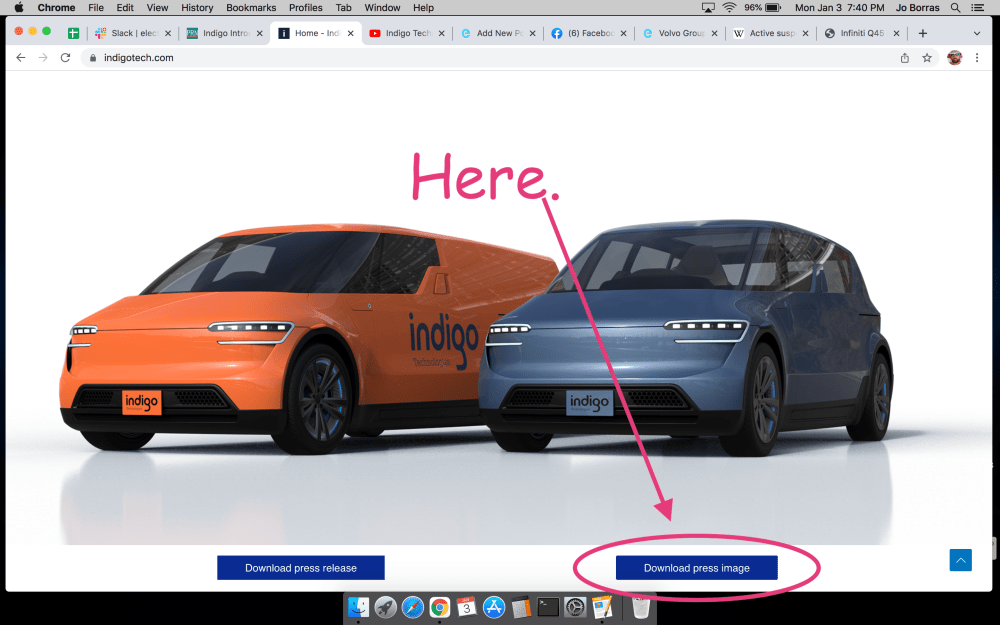
Indigdo Technologies promises “a new class” of purpose-built electric vehicles that it says are smooth, spacious, sustainable, and aimed at the meaty middle of the rideshare and delivery markets. They’re also promising in-wheel electric motors, active suspension systems, wireless high-speed charging, and revolutionary battery management software at a competitive price.
Is the Indigo too good to be true?
“We are changing the electric vehicle paradigm by leveraging our revolutionary robotic wheels with integrated active suspension and wireless power transfer technologies to build the world’s first ultra-efficient electric vehicles with superior ride handling and comfort,” reads the Indigo Technologies website. And, as run-on sentences go, trust Jo Borrás when he tells you that’s certainly one of the good ones.
So, what are we dealing with here, really? The short version is that Indigo is offering two versions of its new electric van, FLOW. The FLOW and FLOW PLUS use “robotic IndiWheel” technology that it calls, “the world’s first all-in-one powertrain with simultaneous in-wheel electric propulsion and electric active suspension.”
Hub motors are nothing new, of course. Companies like Aptera and Lordstown Motors have been trying to make them work for a decade (or more, by now), but Indigo’s addition of active suspension — a suspension that effectively predicts road conditions and adjusts the ride height at each corner to keep the vehicle level, as opposed to a passive suspension that simply reacts to the road — is fairly unique outside the racing world and the odd, early ’90s Infiniti Q45t.
Indigo’s wireless charging angle, too, is another one that hasn’t seen major manufacturer attention in a few years.
The official press release, however, is somewhat light on suspension and charging details, choosing instead to repeat the old bromides that have always surrounded hub motors. “Indigo invented robotic wheels that uniquely enable more space and comfort for small urban EVs,” says Will Graylin, CEO of Indigo. “Without the transmission and motor between the wheels, Indigo FLOW has a low, flat floor that provides more cargo space than any vehicle of its size. And the active suspension in each wheel makes for an amazing ride comfort at an affordable price that people will love.”
The press release also announces that Volker Kaese, former Audi Head of Innovation Product Management, Eric Obers, formerly design leader at Porsche and Lucid, and Hugh Robinson, also formerly of Porsche, have joined the Indigo team.
It’ll be interesting to see if Indigo shows up with a fully functional prototype at this week’s Consumer Electronics Show, or if they’ll “just” show a concept or platform. Perhaps tellingly, the company website (as of 7:40PM, EST on 03JAN2021) invites visitors to “download press image” (singular).

Electrek’s Take
If you’re coming out to CES with plans to “shake up” the electric delivery and rideshare business by taking on Amazon-backed Rivian, Google-backed Waymo/Zeekr, and established industry giants like Ford, it probably wouldn’t kill you to — psshh, I dunno. Maybe have the Photoshop kid cobble together four renders? Maybe five, if you’re feeling really spicy?
The odds that Indigo could get active suspension, wireless high speed charging, and in-wheel motors to work at a price lower than Rivian, Geely, and Ford would be long enough with a fully realized factory (just ask Byton). With one render heading into CES?
Big oof.
Source | Images: Indigo Technologies.
Subscribe to Electrek on YouTube for exclusive videos and subscribe to the podcast.
Author: Jo Borras
Source: Electrek



